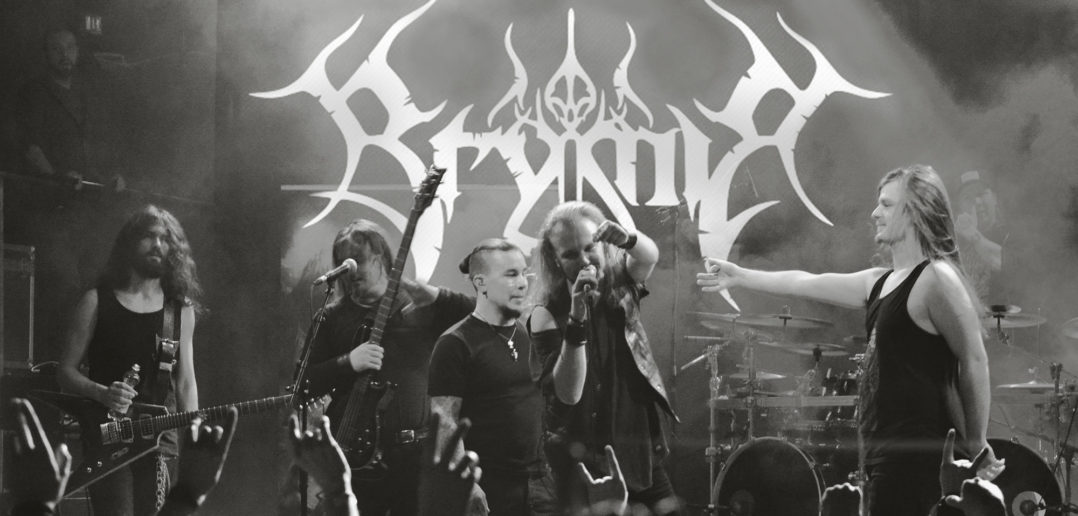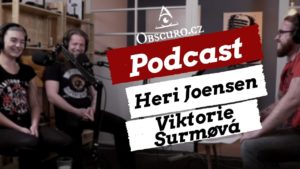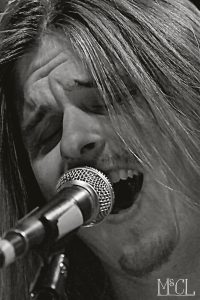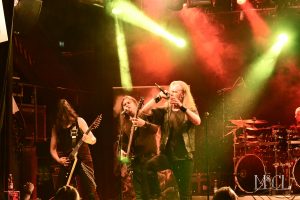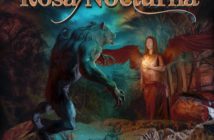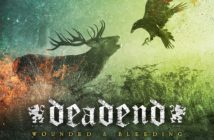Viktor Gullichsen is the vocalist of the Finnish “epic pagan metal horde” as the BRYMIR describe themselves. As their new single is to be released soon and they’re working hard on finishing their next album, there were many good reasons to meet him. Viktor granted me and thereby us some deep insights into Brymir’s creative processes but also how he manages to in the end make his living from music or with music, to be precise.
I met him short before Brymir’s gig on the Metal Crane Festival in Nosturi/Helsinki back in January. The festival was a big success, attracting a lot more people than originally planned. The biggest show of Brymir, however, was the gig on Tuska Metal Open Air’s main stage in 2016. Viktor was so nervous; he admits in the beginning that he avoided to look at the stage from the audience’s perspective before the show. It would not help, naturally, as he is a Tuska veteran visitor, and so knowing each of the stages by heart anyway.
Composing – Viktor learns to play guitar
I admire the passion of many musicians and their pragmatic approaches. If that means learning to play a new instrument it is what is going to happen. So ‘coming’ from Tuska, we start digging deep in technical details of Brymir’s way of composing music. “But the hardest part is just making the composed songs – to translate them into something that actually a band can perform”, Viktor explains. “That’s the hardest part.” He describes in more detail: “Basically right now, it’s mostly me writing stuff. And I just program most things on computer. And I had to learn to play guitar. Now, like this year because Joona (Björkroth), our guitarist, used to come and when I write something on computer and I call him: ‘ok Joona, I have some new melody stuff. Are you coming and play it with the guitar?’ And he said: ‘Yeah, sure.’ But now he joined BATTLE BEAST, and he is touring now very much this year. Many, many shows. But I am just new and I have these many, many tracks, and I need to record these. And I don’t know how to play guitar. So I start practising. And then by editing and just recording really slowly – but like half speed and then cutting it like – than I can make it. Nowadays it really sounds like a real guitarist. But like this, I compose on computer and with software, and then I program the drums, and program the bass, and then the guitar, I play myself. And when this process is ready you can start – so to speak – to translate the programmed drums to a real drummer which is a kind of hard transition. And then of course get my super-technical, faked, edited guitar played. But all is possible. It’s just a matter of really small details of how to get it all fit together. But this is the process. Basically.”
“Is there also a cultural difference between programming and playing or is it ‘only’ (more or less) a technical question?”— Viktor hesitates a moment. “Nowadays, especially that kind of music, we’re doing – which is really kind of modern sound, really like hifi, approach – it’s basically no matter if you played or you programed it because the end it sounds around the same. So it is kind of a cultural thing like in our scene, it’s kind of ok to – not to kind of to fake it – but you have to do it a way that sounds really clean and technically. But then in some other cultures, some other scenes, they hate it and just want to play. Let’s hope that we find the middle ground between these two worlds so that we can in a more smoothly way do the transition from program to actually perform.” Viktor goes on: “It’s hard to organize this traditional band practise. You know when the whole band is there at the same time, playing to the songs. And if there would be more time for this, then we could actually really rehearse new songs but start playing. And now it’s usually like it just doesn’t happen. I write the songs and program it, and then we go to studio and just record it. And just if we play live shows”, he thinks a moment again, “but yeah, I just think that making work it this way where you just can program stuff pretty far just makes it so much easier to actually get stuff done. But then if you wanna go the natural way, you just gonna get to go through so many phases of translating stuff from program to the real world that we just end up spending years and years.”
“That’s what I am learning. This time I try to get it right”, Viktor explains me asking how he defines the point of being finished with a song. “With every record you learn a bit more to detach yourself a bit more from the thing. This is also one reason why it would be so nice for this next album to give the mixing to somebody else. Somebody I trust enough” – Viktor’s face tell me: there aren’t too many in question for this job – “… to do it in a way I would like it but in a way I could just go a away, and say, just travel and block my ears and let it come out or listen to it. I don’t need to listen to it but ….” I tell him about my observation with a frown and ask whom he’d entrust with the mixing. “Well there is Janne (Björkroth) who plays keyboards in Battle Beast. He is like a spiritual member of Brymir, still. And he is really, really, really, really good mixing engineer. He is a guy I could trust. But then again, he is really busy with Battle Beast stuff. So when I think of the actual whole mixing of the whole album it might be pretty hard to get him. The schedule, I think. Brymir will be mixing when they’re just writing new stuff, I think.” Viktor takes a few seconds break. “Let’s see. Money can buy you everything. With enough money you just hire one of these Swedish kick-ass legendary engineers but we’ll see about that. Flush my credit card”, he suggests with a frown. I suggest a bet on a horse race to make the money. Viktor has some more ideas like the lottery ticket. I remind him on the fairy godmother and the wishes she grants. “Or one of our guys needs to find a really, really rich girlfriend.” That rules me out I admit and with his “damn!” we go for the next question, still laughing.
Goals and challenges
As Viktor pointed out the challenge of translating the programmed material into live play I wonder if this means also a challenge on the skill side of the instrumentalists. “Ah, sometimes yeah. I used to be a drummer originally so I program things, and I know how our drummer plays. So I usually program the drums in a way that is possible for him to pick it up straight away. But sometimes it gets just out of control, and I make too hard things which always pushes the bunch which is a good thing, also our guitarists. I know what is possible to play but just sometimes I just put a bit harder than that. So it just pushes you to develop and it’s possible to play.” – “But it is setting the goal a bit more demanding?!” – “Yeah, yeah, yeah, always. And with every album there is one song that is just a little bit faster than the last fastest song”, Viktor says with a shine in his eyes.
“But is faster always the trickiest to play? I heard a doom drummer speak of the difficulties to play extra slow.” – “You know slower can be even harder. But” and after his short break he gets more excited, “… ähm … speed is just something that I am obsessed with in metal! Because it is this one thing that got me addicted with heavy metal in the first place. It’s so fast that I was just laughing, just outrageous. But that’s just myself to make always on track that is a bit faster.” Speaking of very slow drumming: “Yeah, that’s very hard as well”, he admits. “I’d just say it’s basically as hard. Different things. But it’s supposed to be hard, it’s not supposed to be easy.” – “A different kind of challenge then?” – “Yeah, I like it when – with most things in life, not just music – I like the balancing ones, like on the blade of a knife. You can fall at any point. And you can fall and you would die. But it is like living on the edge and pushing it as far as you can go.”
Speaking of Viktor’s goals it is natural to ask for those of the band. “Maybe a goal would be just to become as good as we can be. Improve constantly. And get to a point where we can actually express the music we want to make. That it’s easier and painless.”
“I think we’re going still for the same thing we always went for”, Viktor tells me as I ask about the driving spirit of the band, especially as the real live seem to lie heavy on the band dynamics. “Getting to play the kind of music that we like. That’s the thing. That’s the only thing.”
“Sounds like you are one of those bands that coming home from rehearsal just to listen to your just recorded demos over and over?” – ”Yeah for sure! Yeah, especially me. I am running my stuff and I am really critical on my stuff all the time and see if there is something to make it better which is not really a good thing. I have very hard times switching off. And it also results in different things even before we start the recording I am so tired of it that I cannot listen to it anymore.”
There are more challenges, of course, such as crowded schedules. – “It is a real challenge. And that is also the reason why we have the one guitarist who can fill in if Joona doesn’t make it. Because people are really, really busy with their lives. Usually if there is a gig then you know we just, ok, we just book it. And just gonna make it happen. And everybody does what he can to make it work. But in generally we are pretty busy with real live stuff.”
Very hard to make a living with music
“But music still is the big passion of each band member?”— “For sure. But it is very hard to make a living with music.” – “I think it near to impossible.” – “It’s near to impossible or you have to … or what I do for a living: I produce music. I record and mix with other bands. This is the way I can live with music. But obviously I am not making enough money from my music. And I try to create an environment where I can work with music. But still there is not steady flow but still I keep working with music all the time.”
“Is it a source of inspiration to work with other bands?” – “Often, yeah. I learn very much every time. But then on the other hand it is really hard because my ears start to tire. And often if I have a long production with other bands it might be that I can’t make anything after that for a month because my ears are so strained and my creative energy is just totally empty. So it is just a challenge to organise other bands to produce. You have to do it kind of in periods where you can be 100 % on work. But I am still young and I am new with these things. And I am still developing systems how to keep my energy alive.”
“But then it seems that you are really entirely and 100 % into the production of other bands. Which demands some idealism.” – “Yeah. You also have to learn and I try to get better every time. And this is actually one of my New Years’ promises for this year. More channelling my energy on one thing. Not multitasking all the time. So we’ll see how it goes.”
“How hard is it to get into the style and the spirit of another band for the production?” – “It depends a lot on chemistry. Yes, you know it quite early on if your client and what you think and if your sense of aesthetic works and what is beautiful and what is nice. It’s really easy. And then you’re coming straight, and ‘oh cool’ and you’re just on the same page, and you’re just having fun all the time and coming up with ideas. And sometimes it is really hard. If you have a vision and the client or band just doesn’t understand it then it can be really, really hard work. But at best it is wonderful. If there some really cool people doing some really cool metal or something. And you’re fully going into their thing, and you’re a part of the band for a month or two.”
We are doing everything by ourselves
Back to my actual questions, I would like to learn about the pros and cons on independence. Brymir can do everything on their own (production, marketing etc.) But is it what they want? Or would they wish to have more support from a label or management? “It would be great to get more support. Because now we are doing everything by ourselves. That is producing the music from scratch to finish product, everything. The whole chain: writing, recording, mixing, and doing also this arranging gigs and figuring out the logistics. So marketing and all those things. Just there isn’t enough time to do all of it”, he takes a break and the perfectionist leaks out again: “…. well! That’s the thing it would be really, really, really nice to get more support from … — but we do now gather more people around us who are really willing to help us.” An optimist he is! “Now this one guy who arranges these gigs for us. It’s a really cool guy and he is helping us out with gigs. Just super nice.” – “Iiro (Laitinen, NEM Agency)?” – “Iiro! Thanks. And then Ricu Pääkönen from Ranka Kustannus. He has also helped us a lot. But also when we get more music out then we will also just start feeling the support a bit more. Because everybody is just asking us, and is waiting for new songs. And we’re just ‘It’s coming soon!’ ‘It’s coming soon!’ ‘It’s coming soon!’”, just like he was whispering. He points out the meaning of coming up with new music and the pressure that goes along with people asking for this new music. “But it’s really good to learn these skills by being independent. Because then you understand the process more. Because if all the time you’re just making music and people taking care of your everything, then you might miss out on some good experience.“
“And maybe on some opportunities as well?” – “Yeah.”
“Do you feel better prepared to protect yourselves from being cheated? I mean you know now all the steps of all the processes around. I would hope that is helpful to get aware of traps and foot angles on time. Viktor is enthusiastically confirming my thoughts.” –– “It is one of the good things and bad things that happened when we were laid off from Spinefarm records after the first album. Which cut us off from their resources. All this that a label provides. It meant that we were forced to produce the music ourselves. And this was a really good thing because this – like my current work situation – it is based on the experience and got started the whole thing. And we just can write music and make a record ourselves independently without having to hire someone from the outside. This is the most valuable thing we learned.”
“So you learned to swim and made the best out of it?!” – “Yeah. But now it started to be so much that it would be nice to have somebody, you know, managing.” – “Sure, while on the other hand it means things are running in a way.” Viktor agrees and I go on: “Like climbing up the ladder promoting the band.” – „Yeah, it’s always like three steps up, four steps down. he says a bit low. No! It it’s other way round. More steps up than down! I correct with a smile and Viktor replies “Yes, yes. It is. Definitely.”
Joona fails on time travelling
Speaking of the stand-in guitarist again I’d like to know if it is always the same person and how this one is related to Brymir and its dynamics, if he even could be taken an additional band member. “Yeah basically. He is a really good friend of mine, and I played in other bands with this guy. And there is lots of random stuff. He is a really good friend of mine, Antti Nieminen (IA, STORMIC), super-cool guy. Actually, we went to play in Japan. And Joona couldn’t make it because he is in the same time playing in the US with Battle Beast. Imagine how painful it is for Joona as it is like a dream come true, but he couldn’t play at the same time. And he tried to make it to Japan but it was just a logistical nightmare because the stand-in guitarist for Battle Beast would have needed to get the visa thing which is not so easy especially with the changes since the Trump administration, and stuff like this. And then fly against the clock so he’d lose a lot of hours travelling from Texas to Tokyo, or Osaka, straight to the shows, like 36 hours of travelling. And no practise and nothing, as he is touring with Battle Beast and so it is impossible. And then I call Antti: ‘Hey do you want to go to Japan?’ And that is how it started, and now he can come in and fill in for Joona, I mean, if we need it.”
“As you know each other and it’ll be him again the dynamics are easier.” – “Yeah, yeah, yeah. We know each other, and we are really good friends together and it’s just fun all the time. We are lucky we have this situation where the stand-in member came from so close by.”
“Music-wise, too?” – “Yeah, yeah. IA – It’s shamanic metal. I used to play drums in this band. It’s of a trance-inducing, like really heavy, quite slow stuff. Quite monotonic stuff. We sing about these spiritual kind of things. And then StorMic is a bit like metal-core influenced metal. Pretty slow. Cool stuff.”
A bunch of hard-core gamers meets Thor
I wonder with all the martial arts topics in his lyrics and sagas if he and/or the other band members happen to be role players. “No, not really, but we all play something like computer games and stuff like this.” Little later he admits that they are “… pretty much hard-core gamers. The band has like, what we have been doing our whole lives since we were really young is playing computer games and making music.” It’s common combination I have found and often a source of inspiration for lyrics. Here, too? “Well, I don’t know, it just fits the aesthetics of this thing. Archetype. Caves. Fighting dragons with swords. And some epic stories. This dark and medieval thing has always been a source of inspiration.” Viktor confirms that he is also fascinated to by medieval architecture for example in Eastern Europe.
I challenge Viktor with my odd question. It is about the Northern God Thor in his smithy hammering on the newest sword and he’s been working on it for a long time. Then there is this one thunder so much louder than it should be resulting from his hammering and some weird smoke is rising making him dizzy and drift away. Once he wakes up again there is a guy next to him. That one wears a skirt-like, whitish something. He is dark-haired and has sun-burned skin. He is just in that very moment putting coins on Thor’s eyes. What happened and what will happen next? Viktor remains silent for a couple of seconds before admitting: “This is a difficult one!” With a frown I say that I have not challenged him so far so that is his challenge. He thinks longer only to admit: “This is a weird story.” Few seconds later he looks at me: “Is this a myth?” I reply smiling that it is no more than my weird imagination and perhaps mixing up stuff which is what RPG game masters tend to do. He sighs again still uncertain what to reply. “What happened”, Viktor asks and sums up: “So Thor wakes up to find this guy putting coins on his eyes.” – “Yeah, the other one is putting coins on Thor’s eyes!” I repeat to make sure he gets the image. “Ahhhh! Maybe it’s just Thor who realizes that he is dead.” He laughs for a second and repeats in an ironic tone “He woke up dead! He got fucked up on his fumes. He forgot to wear this protective mask. So he died and woke up dead.” – “Ok, so far so good. But what’s going on now? How will the story go on?” I remind him on the look of the other guy. “I gotta say, I have no idea.” – “It’s the ferry man. Greek mythology.” “Ah yeah, to Hades! Ah, yah. Yah! Ok. Thor goes to Hades.” – “But what will he do there?” – “Probably get fucking drunk from some Erebos beer. Best Hades – best beer! Get some nice girls.” – “There might be a lot of them.” – “Yeah. He will be a happy guy. The Thor guy who went to hell to get fucked. Sounds good. Retirement!” Laughing – we both are – I thank Viktor for the time he took to meet me and reply to my questions.
Thinking back to meeting Viktor, I am a bit confused. He is known for his queer humour (especially on stage) but during our conversation he showed mostly his thoughtful and a more serious side. There were some funny moments, naturally. And at least to me, we had a relaxed, yet not superficial time. So I think that our conversation and the atmosphere mirrors the importance of music to Viktor’s life. Music matters!

